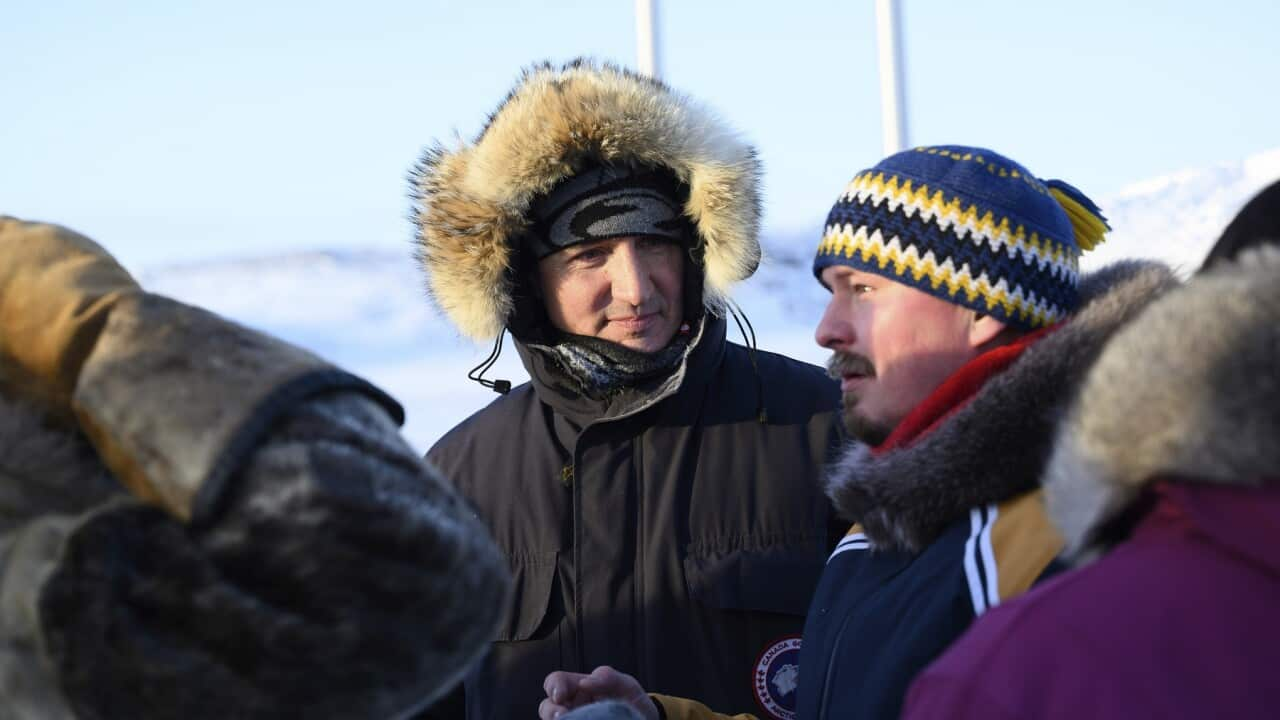English
Two million square kilometres of land and water have been transferred from Canada's government to the government of the Indigenous territory of Nunavut.
It's the largest land transfer in the history of Canada.
Nunavut Premier Pauloosie Jamesi, or P-J, Akeeakog says the transfer marks the historic return of decision-making power to the people of Nunavut.
“What a historic moment we were just able to achieve. I am humbled to be here to be able to get the historic signing of the devolution agreement. It has been many years in the making with many of the leaders who had that vision of decision making coming a lot closer to home. And today marks a new beginning, where Nunavut will make decisions for Nunavut. And what a historic moment.”
Nunavut, which has a population of around and comprises most of Canada's Arctic Archipelago, officially became a territory in 1999.
The devolution agreement signed in recent days gives Nunavut full control of its lands and its resources, which includes gold, diamonds and rare earth minerals as well as oil and gas.
It also grants the territory the right to collect royalties from these resources and to amend land and resource management legislation.
The territory's former senator, Dennis Patterson, says it's a significant moment for the Nunavut territorial government and its people.
"I actually think it's an act of decolonisation, because the remote colonial administration in Ottawa may be well-intentioned, though they have been running our affairs without us having control."
The territory's rich deposits have gained increased attention in recent years, as climate change continues to make the arctic territory more accessible for mining and shipping.
Canadian Prime Minister Justin Trudeau says the transfer in resource ownership makes possible a stronger future for the territory and its traditional owners.
"But the people who live on this land, the Inuit, have lived here and created prosperity and culture and communities and a future for themselves from time immemorial. It's also around sovereignty and it's around people's right to self-determination and building a better future for themselves in a complicated world."
Talks of a devolution agreement for Nunavut started almost a decade ago.
Mr Patterson says the decision finally brings Nunavut in line with the kind of authority granted to Canada's two other territories - Yukon and the Northwest Territories - which respectively signed similar agreements in 2003 and 2013.
"It's giving Nunavut province-like authority that the two other territories already won in 2003 and 2013 and Nunavut and Yukon and NWT."
Mr Trudeau says the official term 'devolution' does little to communicate the significance of this transfer in control, which officially begins on the 1st of April.
"Inuit have hunted and fished and lived on these lands for generations. Some are going back well before recorded history. Today begins a new chapter in the history of Nunavut, a transformative chapter. The formal process, formal name for this process is devolution. But in many ways it's more of an evolution."
Italian
Due milioni di chilometri quadrati tra terra e acque sono stati trasferiti dal governo canadese al governo del territorio indigeno di Nunavut.
Si tratta del più grande trasferimento di terra nella storia del Canada.
Il premier del Nunavut, Pauloosie Jamesi, o P-J, Akeeakog, afferma che il trasferimento segna lo storico ritorno del potere decisionale al popolo del Nunavut.
“What a historic moment we were just able to achieve. I am humbled to be here to be able to get the historic signing of the devolution agreement. It has been many years in the making with many of the leaders who had that vision of decision making coming a lot closer to home. And today marks a new beginning, where Nunavut will make decisions for Nunavut. And what a historic moment.”
Il Nunavut, che ha una popolazione di circa 40.000 persone e comprende la maggior parte dell'arcipelago artico del Canada, è diventato ufficialmente un territorio nel 1999.
L'accordo di devoluzione firmato nei giorni scorsi conferisce al Nunavut il pieno controllo delle sue terre e delle sue risorse, che comprendono oro, diamanti e minerali di rari, oltre a petrolio e gas.
Inoltre, concede al territorio la facoltà di riscuotere i diritti da queste risorse e di modificare la legislazione sulla gestione del territorio e delle sue risorse.
L'ex senatore del territorio, Dennis Patterson, afferma che si tratta di un momento significativo per il governo territoriale del Nunavut e per la sua popolazione.
"I actually think it's an act of decolonisation, because the remote colonial administration in Ottawa may be well-intentioned, though they have been running our affairs without us having control."
I ricchi giacimenti del territorio hanno attratto attenzione negli ultimi anni, poiché il cambiamento climatico continua a rendere il territorio artico più accessibile per l'estrazione e la navigazione.
Il Primo Ministro canadese Justin Trudeau afferma che il trasferimento della proprietà delle risorse rende possibile un futuro più forte per il territorio e per i suoi proprietari tradizionali.
"But the people who live on this land, the Inuit, have lived here and created prosperity and culture and communities and a future for themselves from time immemorial. It's also around sovereignty and it's around people's right to self-determination and building a better future for themselves in a complicated world."
I colloqui per un accordo di devoluzione per il Nunavut sono iniziati quasi un decennio fa.
Secondo Patterson, la decisione porta finalmente il Nunavut in linea con il tipo di autorità concessa agli altri due territori canadesi - Yukon e Territori del Nord-Ovest - che hanno firmato accordi simili rispettivamente nel 2003 e nel 2013.
"It's giving Nunavut province-like authority that the two other territories already won in 2003 and 2013 and Nunavut and Yukon and NWT."
Trudeau afferma che il termine ufficiale "devoluzione" rende poco l'idea del significato di questo trasferimento di controllo, che inizia ufficialmente il 1° aprile.
"Inuit have hunted and fished and lived on these lands for generations. Some are going back well before recorded history. Today begins a new chapter in the history of Nunavut, a transformative chapter. The formal process, formal name for this process is devolution. But in many ways it's more of an evolution."




